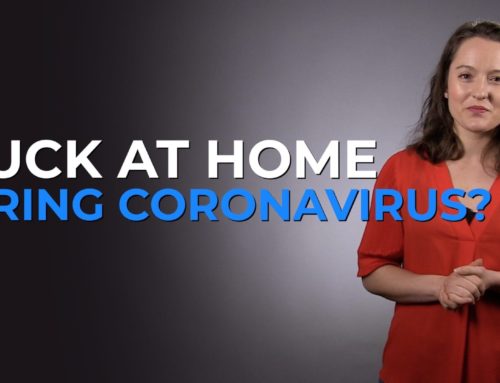Joe Beam: I have to confess, I’ve never read the book.
Kimberly: I haven’t either. I just know what the five of them are.
Joe Beam: What are they?
Kimberly: They are physical touch, quality time, acts of service, words of affirmation, and gifts, gift-giving.
Joe Beam: It’s all supposed to fit within those five?
Kimberly: Yeah, exactly. We could probably do a whole part right now just about how there’s more than that that we need.
Joe Beam: It’d be an absolutely awesome book, but the first thing I’d say is I think there’s a heck of a lot more than just those five.
Kimberly: Why do I have to choose words of affirmation over gifts? I like them both.
Joe Beam: Let’s just take your question and change it a little bit. What I’m hearing you say is, “There’s some things I want him to do for me and he’s saying, ‘But you’re trying to make me be somebody that I’m not.'”
Let’s just leave it out of the love languages and put it down to that. Okay. Be careful that you actually aren’t trying to make him be something that he’s not.
For example, if your husband’s one of these guys who’s not very talkative, he’ll talk a little bit but not a lot, I’m thinking of a buddy of mine from years ago right now that if he said six words it was a major conversation. But his wife, his wife was one of those personalities that just loved to talk and talk a lot. Often, he would just sit there while she just talked and talked and talked and then she would look at him like, “Your turn because I need you to say these things.” He’d say three words. It was not his nature to do so.
But if you’re saying, “But wait a minute, I need to hear those words,” okay. Then we’re out trying to make him into somebody that he’s not because nobody wants that. Nobody wants to be that I’ve gotta fit your criteria to be loved, whatever that criteria might be. You have to understand that I think the way I think, feel the way I feel. I believe the way I believe. I act the way I act. At least don’t try to make me meet your criteria.
Now, it doesn’t mean, then, that there’s no fixing this. There is, as long as you are willing to do some compromising. Say what you mean, number one. Figure out what really is important to you at the core. Now, there’s words of affirmation. I’m not exactly sure how that’s defined or described in the I can illustrate that with Alice and me. My wife, Alice, came from a home where they hugged for everything.
They’re just a hugging bunch of people. I came from a home where my family hardly hugged for anything at all. As a matter of fact, I think the last time my mother hugged me, I was 12. It’s not because she doesn’t love me, we just weren’t a touchy-feely family. Alice and I got together, married each other, and she’s like huggy-huggy. My response was, “Eh, that’s not like I am. That’s not who I am.”
Now, there had to be a compromise in between those two things. Why? Because saying, “That’s not who I am” didn’t justify my not giving her what she needed. But at the same time, she needed to understand that I’m not gonna be lovey-huggy-touchy every minute of every day.
Her core was, “Give me enough physical touch where I feel secure and safe.” My core was, “I’m happy to do that as long as you understand and accept the fact that I’m not like that all the time.” Working from our core, we worked out a compromise and I actually asked her, “Teach me to do what it is you want me to do and then accept the fact that I’ll do it as you taught me, but it’s not gonna be as much as you wanted.”
Now, if you start working out that kind of compromise, the next thing you do, then is you start rewarding when you get what you want. You say, “What?” It’s behavior modification 101. If you went to college, it’s the first psychology class you had or maybe a little later in psychology, but behavior mod 101. You say, “What’s that?” Whenever the other person does what you want, reward it. That’s just it. Reward it. If you’re wanting to be touched more, when he does touch you, give him some kind of reward. You’re saying, “What?” You have to figure out what it is that he wants, and you give him that.
Let’s say he likes to have his ego stroked a little bit when he hugs you. It’s like, “Man, three’s nobody on Earth that can hug like you do.” Whatever it is that’s important to him, that’s what you give him back. Now, if you do that, you actually get more of the behavior because of the fact that he enjoys doing it because it did something for him, as well. But you said, “But I don’t wanna train him like a seal.” We all train each other one way or the other, believe it or not. We know what the other person reacts positively to and what the other person reacts negatively to.
Whatever it is that you want, first try to reach the compromise. Explain it to him not in terms of, “You need to do this!” People react badly to that. But in terms of, “Here’s something I need you to do for me. I’m not asking you to become a different person. I’m not asking you to do it all the time. I’m just saying here’s some things I need. Let’s talk about how you can do that in times that feel comfortable and good to you.” Then establish that. Whenever he does it, knowing what’s important to him, whatever it might be, reward him somehow.
For example, and I’ll quit, I’m rambling a little now, but let’s say his favorite thing is homemade peach pie the way they made it back in the old days where it was a pound of peaches, a pound of butter, a pound of sugar, and a pound of flour.
Kimberly: Which is literally my grandmother’s recipe.
Joe Beam: It’s literally your grandmother’s recipe. Then when he does something you really want, next meal you got that great peach pie there for him. If he says, “Is there a special occasion?” You say, “Nope, I just love the way you’ve been loving me lately.” That’s the way you encourage the behavior. First the compromise, then the reward. Now, I’m giving you just the principle. Ms. Kimberly often points out we’re giving you the 80% but?
Kimberly: But there’s the extra 20% that is situationally specific. If that’s where you are, where you’re saying, “I get that in principle, but I still can’t figure out how to apply it to my specific situation because of whatever reason,” then that is why we have our coaches who can work with you one on one or as a couple. Wherever you are in the world, they do it by phone. People from Dubai to Germany to Canada to Hawaii, our clients are international. We can help you with that extra 20% because what you don’t wanna do is get it wrong.
You don’t wanna just hear it and interpret it maybe in a way that we didn’t mean it and then end up implementing something that’s gonna make things worse than better. Now, we try, and I think we do a great job, of explaining things to where you’re not gonna do that, but there’s still such value in a non biased third party person who’s gonna be supportive, who’s gonna walk you through this, both of you or just you as an individual. It’s absolutely priceless. That’s what our coaching is for. We’d love to have you if that’s something you’re looking for.
Joe Beam: Mm-hmm. Maybe what you can do with what I just talked about is sit down and make a list. “This is the way I wanna demonstrate it.” Make a list of, “This is what he really wants.” Start off with a list. Try it on your own. If it works great, you don’t need to call us for this coaching. If you try it and it’s not working, we’ve got people that’ll help you with you.
In other words, we don’t think we have to tell you everything to do in life. We know that you have wisdom and you have insight, but sometimes you just get stuck. You try it and it’s not working. But first of all, try it on your own. If you can make that work, great. Send us an email and tell us that it did. As a matter of fact, I’d love to start reading on this program emails from people who say, “Hey, I heard you guys suggest blank. I did this. Let me tell you what happened.” We’d love to share some of those things. But if it doesn’t, call us. We’ll help you with it. But if it does, let us hear about it.
Kimberly: You know, this is a great time to let you know that if you have something you wanna submit, whether it’s a question or it’s a testimony or if it’s something that you’ve tried that you’ve learned here that you wanna share with us and you want us to be able to share, we’re gonna do some really cool stuff with things that we get that we’ll talk about at a later show, but you can email us. There’s a special email just for all of you, and that’s askjoe@marriagehelper.com. You can send in those questions, those testimonies, those just success, small victories. We wanna celebrate those small victories with you, as well, and encourage others with it.
If you have been married longer than a minute, then you know that there are hard times in marriage and there’s great times in marriage. It’s so rewarding when you are able to share even the smallest of victories with people who are gonna celebrate with you because marriage is hard. But doing it together, having a community of people who are gonna support you in it, makes a huge difference. So askjoe@marriagehelper.com. We’d love to get that stuff for our upcoming shows.
Joe Beam: Excellent, that sounds good to me. We’d love to hear from you.
Kimberly: Absolutely.
To speak with a Marriage Helper client representative, please fill out this form here.




